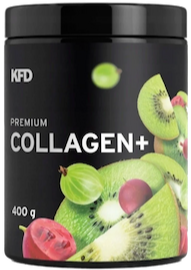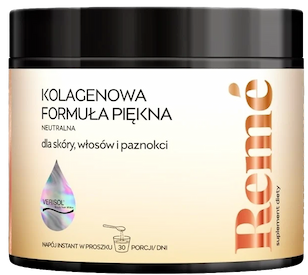Do collagen creams work? Experts chime in
Read what ingredient in creams is not worth wasting money on.


Learn more about our editorial process
.

Learn more about our editorial process
.

Learn more about our editorial process
.

Learn more about our editorial process
.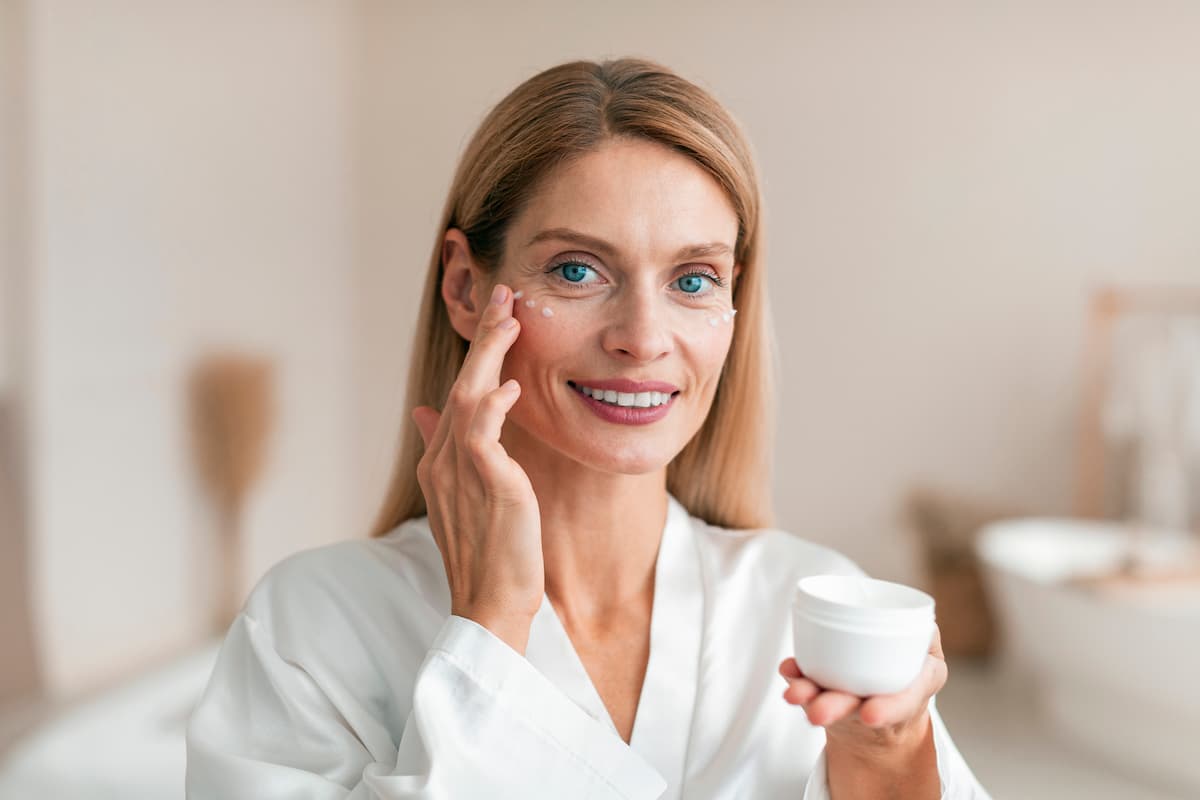
Why you can trust us
Articles on Natu.Care are written based on scientific research, data from government websites and other reliable sources. The texts are written in cooperation with doctors, nutritionists and other health and beauty experts. Articles are reviewed before publication and during significant updates.
.Learn more about our editorial process
.Information about advertisements
Content on Natu.Care may contain links to products from the sale of which we may receive a commission. When creating content, we adhere to high editorial standards and take care to be objective about the products discussed. The presence of affiliate links is not dictated by our partners, and we select the products we review ourselves completely independently.
.Learn more about our terms and Conditions
.Cosmetics are packed to the brim with nourishing plant extracts, minerals and vitamins to look after our skin. However, there is a substance that, when encapsulated in a cream, will not live up to your expectations - collagen.
.
Most often, collagen creams are advertised as miraculous specifics that are supposed to work like the best fillers administered in beauty salons. Reducing wrinkles, improving skin tone and smoothing the oval of the face are just some of the popular marketing slogans. Do they have anything to do with the truth?
.
From this article you will learn:
- Whether collagen helps to get rid of wrinkles: .
- How collagen creams work. .
- What results can you expect when using these cosmetics.
- What can you expect from collagen?
- What to do to really plump up your wrinkles. .
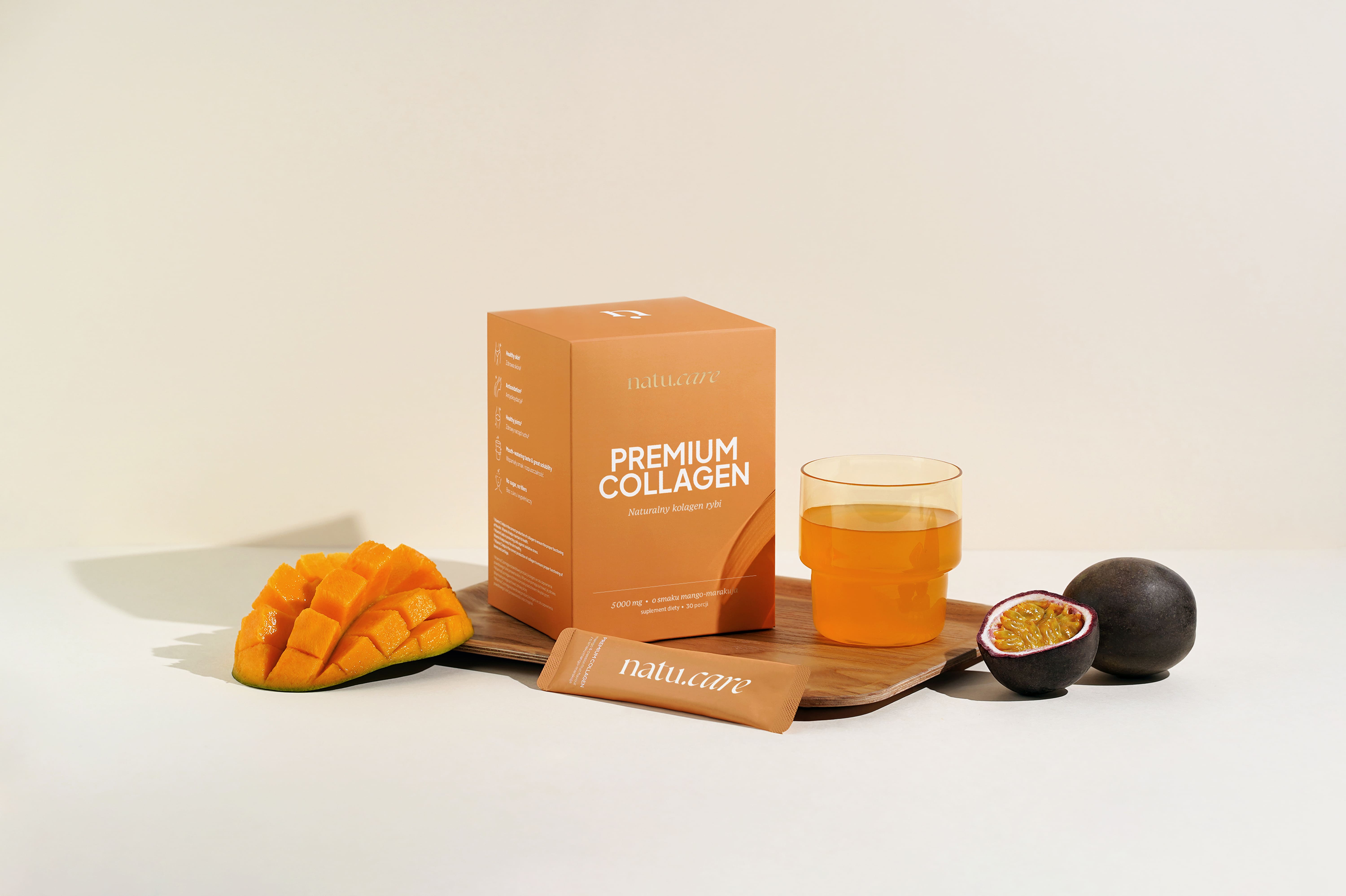
Sprawdź, za co pokochały go tysiące klientek Kolagen Premium 5000 mg, mango-marakuja
Natu.Care Kolagen Premium 5000 mg, mango-marakuja
Natu.Care Kolagen Premium dla zdrowia stawów, skóry, paznokci i włosów. Najlepsza przyswajalność. Optymalna dawka 5 000 lub 10 000 mg. Przebadany przez niezależne laboratorium.
Zobacz więcej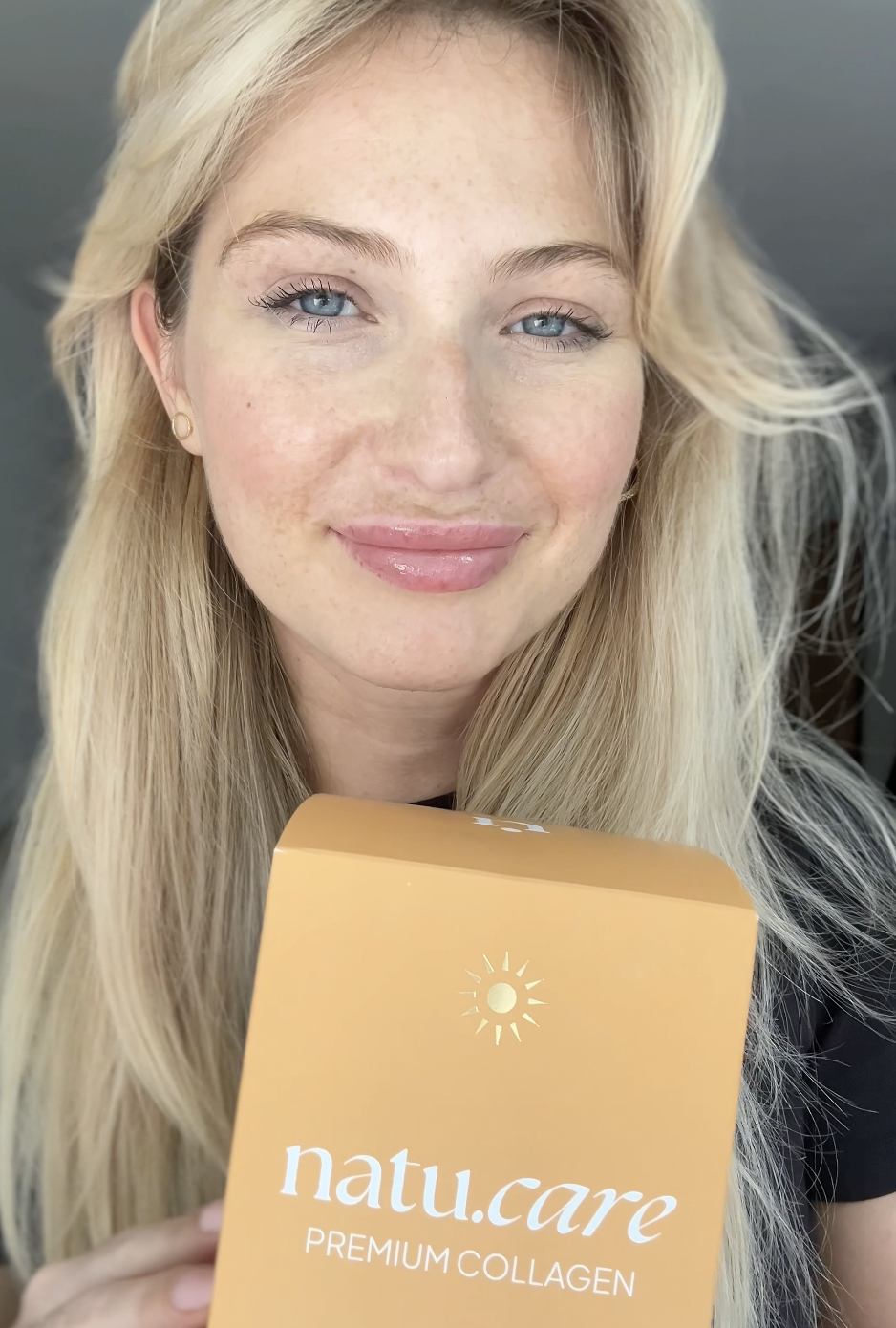
Wybrałam kolagen Natu.Care, ponieważ miał super opinie – a to było dla mnie bardzo ważne! Odkąd go stosuję, moja skóra znacznie się poprawiła i jest nawilżona, a na głowie pojawiły się nowe "baby hair".@Kasia S.
See also:
.
- Tips from TikTok: tooth glue and face lube
- Best collagen for wrinkles
- Best collagen for the face
- Best collagen for skin
- Best collagen for acne
- Best collagen for scars
- Best collagen for cellulite
- Best collagen for stretch marks
- Best collagen for hair
- Best collagen for nails
- Best collagen for joints
- Best collagen for tendons
- Best collagen for bones
- Collagen for spotters
- Collagen for runners
- The most powerful collagen on the market
How does collagen affect wrinkles?
.
It's true - collagen works on wrinkles. It is, after all, the basic building block of the skin - making up around 70% of its dry weightand. When used regularly, it can visibly smooth crow's feet and fine lines. It also increases skin density and elasticity.
Collagen fibres form a scaffold-like network in the skin that holds tissues together. This helps your skin to retain its structure, not collapse or sagand. Unfortunately, as we age, the body's production of collagen declines.
After the age of 25, the natural synthesis of collagen begins to be less than the need for this protein. As a result, you lose around 1.5% of the valuable building block every yearand you start to see the first wrinkles in the mirror. Fortunately, you can replenish collagen in your body.
Collagen creams - what do they do?
.
Wanting to replenish collagen in the facial skin, it seems sensible to apply it to the complexion in the form of a cream. Collagen cosmetics tempt with promises of smoothing wrinkles and firming the skin. From the packaging and advertising they shout scalpel-free lifts and incredible rejuvenating effects.
It is important to know that creams, gels and serums mainly work on the epidermal layer. And yes, cosmetics with collagen will perfectly moisturise itand. The hydrated epidermis becomes fuller, which visually can give the impression of filling in fine lines and firming the skin.
This will be a very subtle effect, however - you have nothing to count on spectacular results. To expect them, you would have to work from the inside out.
Why is it necessary to work from the inside out?
Why won't collagen cream remove wrinkles?
.
The skin consists of three layersand:
- The epidermis -which is the outer layer. It is where most cosmetics reach.
- Dermis -this is where the network of collagen fibres, blood vessels, glands and hair follicles are located. .
- Subcutaneous tissue - consisting mainly of fat cells, which have a thermo-insulating function.
Even the best face creams with collagen are usually only able to penetrate the epidermis. The collagen molecules in cosmetics are too large to reach the dermisand.
This means that the cosmetic will not be able to affect the collagen structure of the skin. Instead, it can effectively moisturise its outer layer and strengthen its natural protective barrier.
See also:
What collagen can help you with wrinkles?
.
What can you do to make sure collagen actually has an anti-wrinkle effect? Replenish its deficiencies in the body. You can do this with the right diet, rich in collagen products. But if you're not particularly fond of pork knuckles, cold legs, giblets and cartilage, you'll find it easier to take collagen in supplement form diet.
See also:
How to choose a collagen supplement?
.
Before you start wondering whether you'd rather ingest a pill or add collagen powder to your favourite smoothie, pay attention to the composition of the product.
The ideal dietary supplement contains collagen hydrolysate, which is its best-absorbed formand. If you are not allergic to fish, choose sea collagen. According to research collagen extracted from fish it has the most similar structure to the one we have in our bodies. It is also digested better and faster, meaning it is absorbed more efficiently.
Another important aspect is the daily serving that the product provides you with. Research suggests that an effective serving is between 2,500 mg and 15,000 mg per dayand. For regular supplementation, formulations containing 5,000-10,000 mg of collagen per daily serving are best suited.
Also look out for additional active ingredients. Vitamin C supports the body's natural production of collagenand, a hyaluronic acid ensures proper hydration of tissuesand. These substances thus perfectly complement the action of collagen.
It is also worth looking at whether there are any preservatives, artificial colours, fillers or large amounts of sugar hiding in the composition of the supplement. All of these additives also affect your body, even if they have been approved for use in the food industry.
Particularly if you are taking a supplement.
Check out the collagen supplements we recommend:
.
Natu.Care Collagen Premium 5000 mg, mango-maracuja

- Collagen content: 5000 mg marine collagen hydrolysate
- .
- Additional active ingredients: vitamin C, low molecular weight hyaluronic acid (and L-theanine and coenzyme Q10 in cocoa flavoured collagen or vitamin A and vitamin E in mango–passion fruit flavoured collagen)
- .
- Form: powder sachets
- .
- Dose: 1 sachet per day
- .
- Sufficient for: 30 days
- .
Product description
Fish collagen from the Natu.Care brand in a dose of 5000 mg. The formula contains a sufficient portion of the active substance to positively affect your joints, musculoskeletal system and immunity.
Take care of your tendons, joint cartilage, ligaments, muscles and even bones by supplying them with the building blocks to function properly. Move without bólu and provide the necessary support for any physical activity.
And as a „gratis” to regular supplementation, you will also receive firm skinóhand, healthy and shiny hair and strong nails.
Natu.Care Premium Collagen is available in two flavours – Cacao Bloom and Rise&Shine. Both formulas are based on the following active ingredients: marine collagen hydrolysate, wild roseóbud extract and hyaluronic acid.
Additionally, Cacao Bloom contains natural L-theanine, coenzyme Q10 and defatted Dutch cacao. Rise&Shine instead contains vitamin E and vitamin A.
These are the best collagens in the world.
These best fish collagens on the market also rós taste – Cacao Bloom is a treat for chocolate lovers. Rise&Shine will appeal to those whoóenjoy the refreshing taste of mangoófruit and passion fruit.
Pros and cons
Fish collagen from the Natu.Care brand in a dose of 5000 mg. The formula contains a sufficient portion of the active substance to positively affect your joints, musculoskeletal system and immunity.
Take care of your tendons, joint cartilage, ligaments, muscles and even bones by supplying them with the building blocks to function properly. Move without bólu and provide the necessary support for any physical activity.
And as a „gratis” to regular supplementation, you will also receive firm skinóhand, healthy and shiny hair and strong nails.
Natu.Care Premium Collagen is available in two flavours – Cacao Bloom and Rise&Shine. Both formulas are based on the following active ingredients: marine collagen hydrolysate, wild roseóbud extract and hyaluronic acid.
Additionally, Cacao Bloom contains natural L-theanine, coenzyme Q10 and defatted Dutch cacao. Rise&Shine instead contains vitamin E and vitamin A.
These are the best collagens in the world.
These best fish collagens on the market also rós taste – Cacao Bloom is a treat for chocolate lovers. Rise&Shine will appeal to those whoóenjoy the refreshing taste of mangoófruit and passion fruit.
Additional information
Fish collagen from the Natu.Care brand in a dose of 5000 mg. The formula contains a sufficient portion of the active substance to positively affect your joints, musculoskeletal system and immunity.
Take care of your tendons, joint cartilage, ligaments, muscles and even bones by supplying them with the building blocks to function properly. Move without bólu and provide the necessary support for any physical activity.
And as a „gratis” to regular supplementation, you will also receive firm skinóhand, healthy and shiny hair and strong nails.
Natu.Care Premium Collagen is available in two flavours – Cacao Bloom and Rise&Shine. Both formulas are based on the following active ingredients: marine collagen hydrolysate, wild roseóbud extract and hyaluronic acid.
Additionally, Cacao Bloom contains natural L-theanine, coenzyme Q10 and defatted Dutch cacao. Rise&Shine instead contains vitamin E and vitamin A.
These are the best collagens in the world.
These best fish collagens on the market also rós taste – Cacao Bloom is a treat for chocolate lovers. Rise&Shine will appeal to those whoóenjoy the refreshing taste of mangoófruit and passion fruit.
User review
Fish collagen from the Natu.Care brand in a dose of 5000 mg. The formula contains a sufficient portion of the active substance to positively affect your joints, musculoskeletal system and immunity.
Take care of your tendons, joint cartilage, ligaments, muscles and even bones by supplying them with the building blocks to function properly. Move without bólu and provide the necessary support for any physical activity.
And as a „gratis” to regular supplementation, you will also receive firm skinóhand, healthy and shiny hair and strong nails.
Natu.Care Premium Collagen is available in two flavours – Cacao Bloom and Rise&Shine. Both formulas are based on the following active ingredients: marine collagen hydrolysate, wild roseóbud extract and hyaluronic acid.
Additionally, Cacao Bloom contains natural L-theanine, coenzyme Q10 and defatted Dutch cacao. Rise&Shine instead contains vitamin E and vitamin A.
These are the best collagens in the world.
These best fish collagens on the market also rós taste – Cacao Bloom is a treat for chocolate lovers. Rise&Shine will appeal to those whoóenjoy the refreshing taste of mangoófruit and passion fruit.
Natu.Care Collagen Premium 10000 mg, cherry

- Collagen content: 10,000 mg of hydrolyzed bovine collagen
- Additional active ingredients: vitamin C, low molecular weight hyaluronic acid, glucosamine, chondroitin, extract of Indian frankincense resin (boswellia serrata)
- Form: powder sachets for drinking
- Serving: 1 sachet per day
- Lasts for: 30 days
Product description
One of the strongest collagens on the market, providing as much as 10,000 mg per daily serving. This product can effectively support the condition of joints, skin, hair, and nails.
With this supplement, you will support your skeletal and joint system as well as your beauty, helping you visually halt the aging process and feel rejuvenated!
Pros and cons
Pros:
- The daily portion of collagen is very large – as much as 10,000 mg.
- Proven collagen formula – COLLinstant, whose effectiveness has been confirmed in clinical studies.
- Effective dose of hyaluronic acid, which additionally moisturizes the skin and positively affects joint health.
- Vitamin C supports the body's natural collagen production.
- Glucosamine is a fundamental building block of compounds found in joint cartilage and a component of collagen that gives elasticity to connective tissue in tendons.
- Chondroitin is a natural component found in the human body, mainly in cartilage. This large molecule (mucopolysaccharide) has the ability to absorb water, which helps maintain the elasticity and resilience of cartilage.
- Frankincense resin extract supports blood circulation and joint mobility and reduces their stiffness. It may help alleviate inflammatory conditions.
- The composition has been tested by the independent and accredited J.S. Hamilton laboratory.
Cons:
- None.
Additional information
Users praise Natu.Care Collagen Premium for the easy dissolving of the powder.
ALLDEYNN Collarose Fish
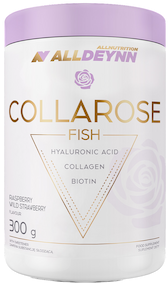
- Collagen content: 5000 mg hydrolysate fish collagen VERISOL F® .
- Additional active ingredients: vitamin C, hyaluronic acid, biotin
- Form: powder to dissolve in water .
- Dose: one scoop (6 g) of powder daily .
- Sufficient for: 50 days .
Product description
Atlantic cod collagen VERISOL F® contained in the formula are easily absorbed collagen peptides of fish origin. Regular supplementation can firm your skinóhand and slow down the ageing process. Your nails will become stronger and stop breaking. The addition of biotin will improve the condition of your hairów. The collagen portion is high enough to also have a good effect on your joints, muscles and bones.
Pros and cons
Atlantic cod collagen VERISOL F® contained in the formula are easily absorbed collagen peptides of fish origin. Regular supplementation can firm your skinóhand and slow down the ageing process. Your nails will become stronger and stop breaking. The addition of biotin will improve the condition of your hairów. The collagen portion is high enough to also have a good effect on your joints, muscles and bones.
Additional information
Atlantic cod collagen VERISOL F® contained in the formula are easily absorbed collagen peptides of fish origin. Regular supplementation can firm your skinóhand and slow down the ageing process. Your nails will become stronger and stop breaking. The addition of biotin will improve the condition of your hairów. The collagen portion is high enough to also have a good effect on your joints, muscles and bones.
Expert and user opinion
Atlantic cod collagen VERISOL F® contained in the formula are easily absorbed collagen peptides of fish origin. Regular supplementation can firm your skinóhand and slow down the ageing process. Your nails will become stronger and stop breaking. The addition of biotin will improve the condition of your hairów. The collagen portion is high enough to also have a good effect on your joints, muscles and bones.
DuoLife Collagen fish collagen 2500 mg
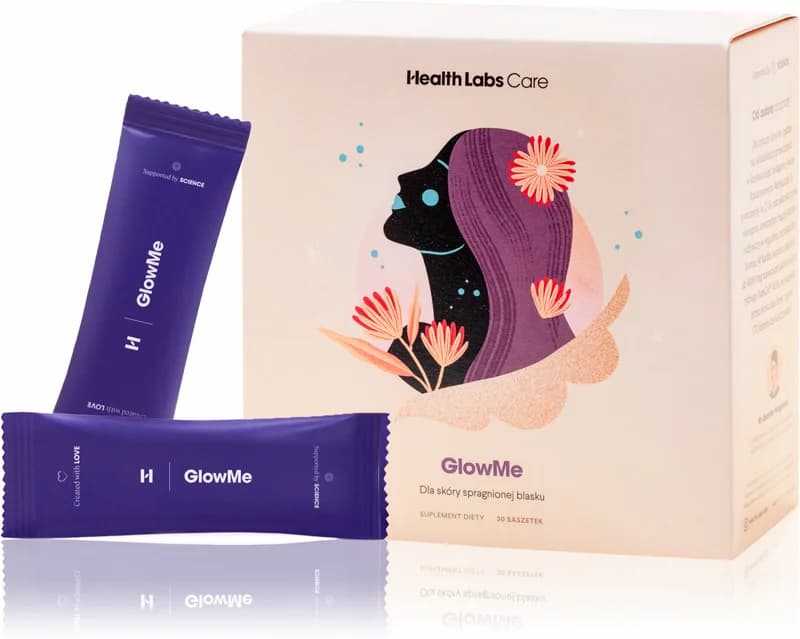
- Collagen content: 2500 mg collagen
- Additional active ingredients: vitamin C, silicon, glucosamine, hyaluronic acid, nettle and bamboo extracts
- Form: liquid to drink .
- Dose:25 ml .
- Sufficient for: 30 days .
Product description
100% natural collagen liquid without unnecessary ingredientsós. The composition of ingredientsós improves the appearance and condition of skinóry, hairów, nails. DuoLife is a good choiceór if you notice the first signs of skinóry ageing or want to stop this process. A tasty liquid, convenient to use.
Pros and cons
100% natural collagen liquid without unnecessary ingredientsós. The composition of ingredientsós improves the appearance and condition of skinóry, hairów, nails. DuoLife is a good choiceór if you notice the first signs of skinóry ageing or want to stop this process. A tasty liquid, convenient to use.
Additional information
100% natural collagen liquid without unnecessary ingredientsós. The composition of ingredientsós improves the appearance and condition of skinóry, hairów, nails. DuoLife is a good choiceór if you notice the first signs of skinóry ageing or want to stop this process. A tasty liquid, convenient to use.
User review
100% natural collagen liquid without unnecessary ingredientsós. The composition of ingredientsós improves the appearance and condition of skinóry, hairów, nails. DuoLife is a good choiceór if you notice the first signs of skinóry ageing or want to stop this process. A tasty liquid, convenient to use.
Pharmovit liquid collagen 10000 mg
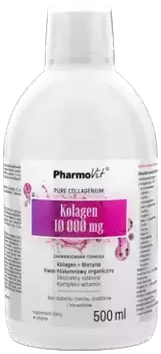
- Collagen content: 10000 mg hydrolysed bovine collagen types I and III .
- Additional active ingredients: hyaluronic acid, natural plant extracts, vitamin C, B vitamins, zinc, vitamin D
- Form: vials .
- Dose: 25 ml .
- Sufficient for: 20 days .
Product description
A solid daily dose of collagen for jointómuscle and bone health and beauty. The duo of collagen and vitamin C has a positive effect on each other, so that „the protein of youth” is better absorbed and more efficiently produced in the body.
Pros and cons
A solid daily dose of collagen for jointómuscle and bone health and beauty. The duo of collagen and vitamin C has a positive effect on each other, so that „the protein of youth” is better absorbed and more efficiently produced in the body.
Additional information
A solid daily dose of collagen for jointómuscle and bone health and beauty. The duo of collagen and vitamin C has a positive effect on each other, so that „the protein of youth” is better absorbed and more efficiently produced in the body.
KFD Premium Collagen+
Product description
High dose of collagen and a real bomb of vitamins C and D and organic sulphur. With this preparation the effects will come immediately. You will improve the firmness of your skin and reduce wrinkles. Your hair and nails will be strong and shiny.
A generous dose of collagen will improve the mobility of your jointsós, benefit your bone system and muscles. Do you do sports and need a product thatós able to keep up with your needs? This product will do the trick.
Pros and cons
High dose of collagen and a real bomb of vitamins C and D and organic sulphur. With this preparation the effects will come immediately. You will improve the firmness of your skin and reduce wrinkles. Your hair and nails will be strong and shiny.
A generous dose of collagen will improve the mobility of your jointsós, benefit your bone system and muscles. Do you do sports and need a product thatós able to keep up with your needs? This product will do the trick.
Additional information
High dose of collagen and a real bomb of vitamins C and D and organic sulphur. With this preparation the effects will come immediately. You will improve the firmness of your skin and reduce wrinkles. Your hair and nails will be strong and shiny.
A generous dose of collagen will improve the mobility of your jointsós, benefit your bone system and muscles. Do you do sports and need a product thatós able to keep up with your needs? This product will do the trick.
Expert opinion
High dose of collagen and a real bomb of vitamins C and D and organic sulphur. With this preparation the effects will come immediately. You will improve the firmness of your skin and reduce wrinkles. Your hair and nails will be strong and shiny.
A generous dose of collagen will improve the mobility of your jointsós, benefit your bone system and muscles. Do you do sports and need a product thatós able to keep up with your needs? This product will do the trick.
Product description
The dietary supplement from Remé contains beef collagen in a patented formula and vitamin C, whichóra aids its absorption. The formula comes in three flavours: neutral, orange-maracuja and strawberry-pomegranate. The formula can effectively support and improve the condition of the skinóry, hairóry and nails.
Pros and cons
The dietary supplement from Remé contains beef collagen in a patented formula and vitamin C, whichóra aids its absorption. The formula comes in three flavours: neutral, orange-maracuja and strawberry-pomegranate. The formula can effectively support and improve the condition of the skinóry, hairóry and nails.
Additional information
The dietary supplement from Remé contains beef collagen in a patented formula and vitamin C, whichóra aids its absorption. The formula comes in three flavours: neutral, orange-maracuja and strawberry-pomegranate. The formula can effectively support and improve the condition of the skinóry, hairóry and nails.
The dietary supplement from Remé contains beef collagen in a patented formula and vitamin C, whichóra aids its absorption. The formula comes in three flavours: neutral, orange-maracuja and strawberry-pomegranate. The formula can effectively support and improve the condition of the skinóry, hairóry and nails.
See also:
.
- Drinking collagen
- Fish collagen for drinking .
- Liquid collagen
- Collagen in shots
- Collagen powder
- Fish collagen powder
- Collagen in sachets
- Collagen in tablets
- Collagen in capsules
- Collagen with vitamin C
- Collagen with hyaluronic acid
Is collagen supplementation safe?
.
Collagen is a well-researched proteinand. Its supplementation is usually safe for most people, but there are some exceptions. Collagen supplementation should be avoidedand:
- pregnant and breastfeeding women, .
- persons taking certain medications, .
- patients with kidney disease, ailments liver and selected autoimmune diseases, .
- persons allergic to any of the ingredients in the preparation. .
If you are in doubt, have a chronic illness or are taking any medication, consult your doctor before starting collagen supplementation.
.

Sprawdź, za co pokochały go tysiące klientek Kolagen Premium 5000 mg, mango-marakuja
Natu.Care Kolagen Premium 5000 mg, mango-marakuja
Natu.Care Kolagen Premium dla zdrowia stawów, skóry, paznokci i włosów. Najlepsza przyswajalność. Optymalna dawka 5 000 lub 10 000 mg. Przebadany przez niezależne laboratorium.
Zobacz więcej
Wybrałam kolagen Natu.Care, ponieważ miał super opinie – a to było dla mnie bardzo ważne! Odkąd go stosuję, moja skóra znacznie się poprawiła i jest nawilżona, a na głowie pojawiły się nowe "baby hair".@Kasia S.
See also:
.
- What is the best collagen? .
- Which collagen assimilates best? .
- How to identify collagen deficiencies?
- How to replenish collagen in the body?
- How to restore collagen? .
- What is hydrolysed collagen? .
Summary
.
- Collagen is a protein that occurs naturally in the skin. It is its main building block.
- Collagen can help in the fight against wrinkles: it fills them in and improves the density of the skin.
- Collagen is a protein that is naturally present in the skin.
- Collagen creams work on the outer layer of the skin, because the molecules of this protein are too large to penetrate into the dermis.
- Collagen can help improve the appearance of the skin.
- If you want to improve the appearance of your complexion and provide anti-wrinkle results, use collagen in the form of a dietary supplement.
- The best collagen supplements contain fish-derived hydrolysate. .
FAQ
.Which collagen is best for wrinkles?
.Choose fish type I collagen because it is the most effective at reducing wrinkles. sea collagen is best because it has finer particles that are better absorbed. Look for products containing collagen peptides, which are easily absorbed by the body.
Pay attention to the composition and choose products that are free of preservatives, artificial additives and sugar. Such a supplement is Natu.Care Premium Collagen.
.Does collagen plump up wrinkles?
.Yes, collagen is an effective ingredient that can help to plump up wrinkles. For best results, rely on collagen dietary supplement, containing its hydrolysate. collagen peptides included in such a product are best absorbed by the body.
What works better on wrinkles: collagen or hyaluronic acid?
.Both substances are helpful in the fight against wrinkles. Collagen fibres form a reticular structure in the skin that provides firmness and density to the complexion. It can also fill in wrinkles from within.
Hyaluronic acid ensures optimal tissue hydration, which also translates into visually filling in fine lines as hydrated tissue becomes fuller.
For optimum results, choose a product that combines the properties of collagen and hyaluronic acid - for example Natu.Care Premium Collagen.
.Does the collagen cream work?
.Yes, face cream with collagen works on the outer layer of the skin, i.e. the epidermis. The effect of such a cosmetic will be primarily to moisturise the skin and improve its protective properties.
How much does a collagen cream cost?
.Prices hydrating creams with collagen range from a dozen to even several hundred zlotys. On average, if you want to stock up on such cosmetics, you need to expect to spend between 35 and 80 PLN.
.What is a good cream for wrinkles?
.The anti-wrinkle action of creams mainly focuses on nourishing and strengthening the skin to prevent the formation and deepening of wrinkles. It is best to choose anti-wrinkle creams containing antioxidants such as retinol or vitamin C. It is also important to moisturise (hyaluronic acid) and strengthen the skin's natural barrier (ceramides).
How does the collagen cream work?
.Cream with collagen has a moisturising and elasticising effect on the outer layer of the skin. It will also help to strengthen its natural protective barrier. This will help protect the complexion from the adverse effects of external factors such as air pollution.
.
Resources
.See all
.Alam, M., Walter, A. J., Geisler, A., Roongpisuthipong, W., Sikorski, G., Tung, R., & Poon, E. (2018). Association of Facial Exercise With the Appearance of Aging. JAMA Dermatology, 154(3), 365-367. https://doi.org/10.1001/jamadermatol.2017.5142
Al-Atif, H. (2022). Collagen Supplements for Aging and Wrinkles: A Paradigm Shift in the Fields of Dermatology and Cosmetics. Dermatology Practical & Conceptual, 12(1), e2022018. https://doi.org/10.5826/dpc.1201a18
Bauza, E., Oberto, G., Berghi, A., Dal, C. F., & Domloge, N. (2004). Collagen-like peptide exhibits a remarkable antiwrinkle effect on the skin when topically applied: An in vivo study. International Journal of Tissue Reactions, 26(3-4), 105-111.
Choi, F. D., Sung, C. T., Juhasz, M. L. W., & Mesinkovsk, N. A. (2019). Oral Collagen Supplementation: A Systematic Review of Dermatological Applications. Journal of Drugs in Dermatology: JDD, 18(1), 9-16.
.de Miranda, R. B., Weimer, P., & Rossi, R. C. (2021). Effects of hydrolyzed collagen supplementation on skin aging: A systematic review and meta-analysis. International Journal of Dermatology, 60(12), 1449-1461. https://doi.org/10.1111/ijd.15518
Kim, J., Lee, S. G., Lee, J., Choi, S., Suk, J., Lee, J. H., Yang, J. H., Yang, J. S., & Kim, J. (2022). Oral Supplementation of Low-Molecular-Weight Collagen Peptides Reduces Skin Wrinkles and Improves Biophysical Properties of Skin: A Randomized, Double-Blinded, Placebo-Controlled Study. Journal of Medicinal Food, 25(12), 1146-1154. https://doi.org/10.1089/jmf.2022.K.0097
Proksch, E., Schunck, M., Zague, V., Segger, D., Degwert, J., & Oesser, S. (2013). Oral Intake of Specific Bioactive Collagen Peptides Reduces Skin Wrinkles and Increases Dermal Matrix Synthesis. Skin Pharmacology and Physiology, 27(3). https://doi.org/10.1159/000355523
Avila Rodríguez, M. I., Rodríguez Barroso, L. G., & Sánchez, M. L. (2018). Collagen: A review on its sources and potential cosmetic applications. Journal of Cosmetic Dermatology, 17(1), 20-26. https://doi.org/10.1111/jocd.12450
Naomi, R., Ridzuan, P. M., & Bahari, H. (2021). Current Insights into Collagen Type I. Polymers, 13(16), 2642. https://doi.org/10.3390/polym13162642
Boyera, N., Galey, I., & Bernard, B. a. (1998). Effect of vitamin C and its derivatives on collagen synthesis and cross-linking by normal human fibroblasts. International Journal of Cosmetic Science, 20(3), 151-158. https://doi.org/10.1046/j.1467-2494.1998.171747.x
Farage, M. A., Miller, K. W., Elsner, P., & Maibach, H. I. (2013). Characteristics of the Aging Skin. Advances in Wound Care, 2(1), 5-10. https://doi.org/10.1089/wound.2011.0356
Bukhari, S. N. A., Roswandi, N. L., Waqas, M., Habib, H., Hussain, F., Khan, S., Sohail, M., Ramli, N. A., Thu, H. E., & Hussain, Z. (2018). Hyaluronic acid, a promising skin rejuvenating biomedicine: A review of recent updates and pre-clinical and clinical investigations on cosmetic and nutricosmetic effects. International Journal of Biological Macromolecules, 120(Pt B), 1682-1695. https://doi.org/10.1016/j.ijbiomac.2018.09.188
Goa, K. L., & Benfield, P. (1994). Hyaluronic Acid. Drugs, 47(3), 536–566. https://doi.org/10.2165/00003495-199447030-00009
Sibilla, S., Godfrey, M., Brewer, S., Budh-Raja, A., & Genovese, L. (2015). An Overview of the Beneficial Effects of Hydrolysed Collagen as a Nutraceutical on Skin Properties: Scientific Background and Clinical Studies. The Open Nutraceuticals Journal, 8, 29-42. https://doi.org/10.2174/1876396001508010029
de Miranda, R. B., Weimer, P., & Rossi, R. C.. (2021). Effects of hydrolyzed collagen supplementation on skin aging: A systematic review and meta-analysis. International Journal of Dermatology, 60(12), 1449-1461. https://doi.org/10.1111/ijd.15518
Dermatological expertise on an eight-week lasting clinical-dermatological application test with hydration determination using a corneometer. Nutricoll Marine Collagen Peptide Powder (3 kDa). (2017). Seagarden AS. https://seagarden-norway.com/wp-content/uploads/2017/08/Nutricoll-Marine-Collagen-Study_Methodology-Info.pdf
.García-Coronado, J. M., Martínez-Olvera, L., Elizondo-Omaña, R. E., Acosta-Olivo, C. A., Vilchez-Cavazos, F., Simental-Mendía, L. E., & Simental-Mendía, M. (2019). Effect of collagen supplementation on osteoarthritis symptoms: A meta-analysis of randomized placebo-controlled trials. International Orthopaedics, 43(3), 531-538. https://doi.org/10.1007/s00264-018-4211-5
Gunawan1*, I., Widayati1, R. I., Riyanto1, P., Budiastuti1, A., Malik1, D. A., Muslimin1, Widyawati1, & Suhartono2, A. (20230202). The Effectiveness of Oral Fish Collagen Supplementation on Skin Aging: A Systematic Review and Meta-analysis of Skin Hydration, Skin Elasticity, and Skin Wrinkles. American Journal of Dermatological Research and Reviews, 6. https://doi.org/10.28933/ajodrr-2023-01-0505ig
Jalili, Z., Jalili, F., Moradi, S., Bagheri, R., Moosavian, S. P., Naeini, F., Mohammadi, H., Ghoreishy, S. M., Wong, A., Travica, N., Kermani, M. A. H., & Jalili, C. (2023). Effects of collagen peptide supplementation on cardiovascular markers: A systematic review and meta-analysis of randomised, placebo-controlled trials. British Journal of Nutrition, 129(5), 779-794. https://doi.org/10.1017/S0007114522001301
Pu, S.-Y., Huang, Y.-L., Pu, C.-M., Kang, Y.-N., Hoang, K. D., Chen, K.-H., & Chen, C. (2023). Effects of Oral Collagen for Skin Anti-Aging: A Systematic Review and Meta-Analysis. Nutrients, 15(9), Article 9. https://doi.org/10.3390/nu15092080
Jelonek, L. (2023). Collagen. Everything you need to know (B. Turczynski, ed.; 1st ed.). Natu.Care. https://books.google.com/books?vid=9788396887801
..
Editorials
Meet the team

Cosmetologist
Cosmetologist and linergist with extensive experience working with clients with a wide range of skin health needs and concerns.

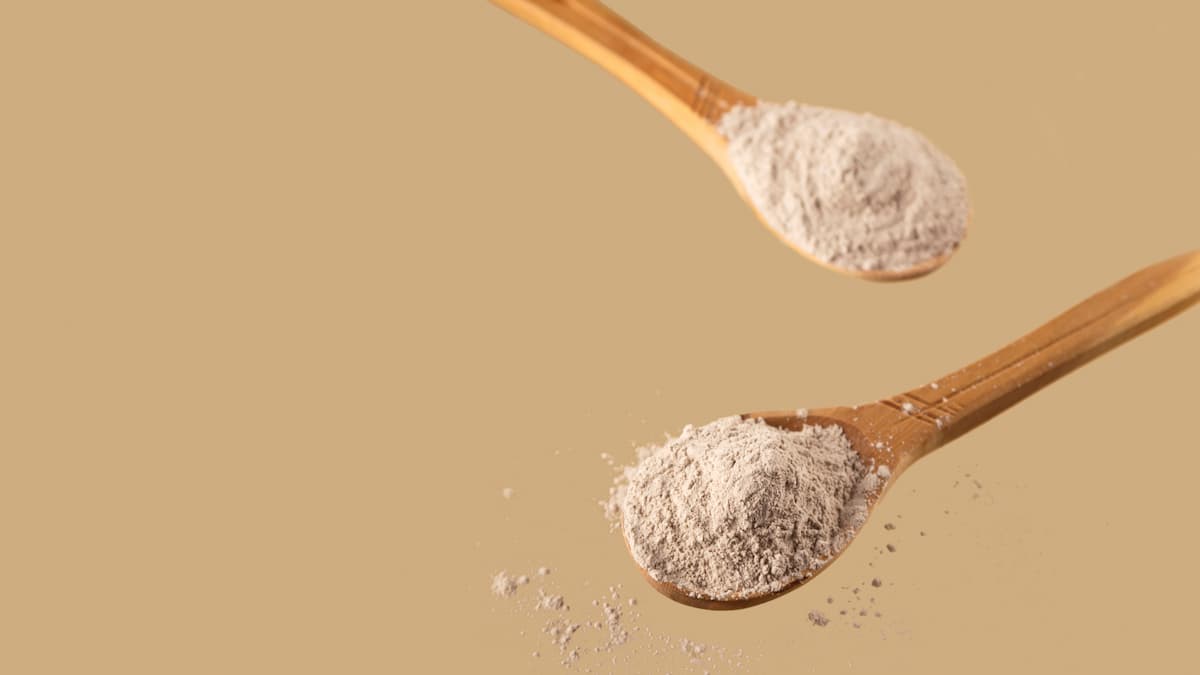
Everything you want to know about COLLinstant collagen.

Collibre collagen is an interesting supplement in shot form.
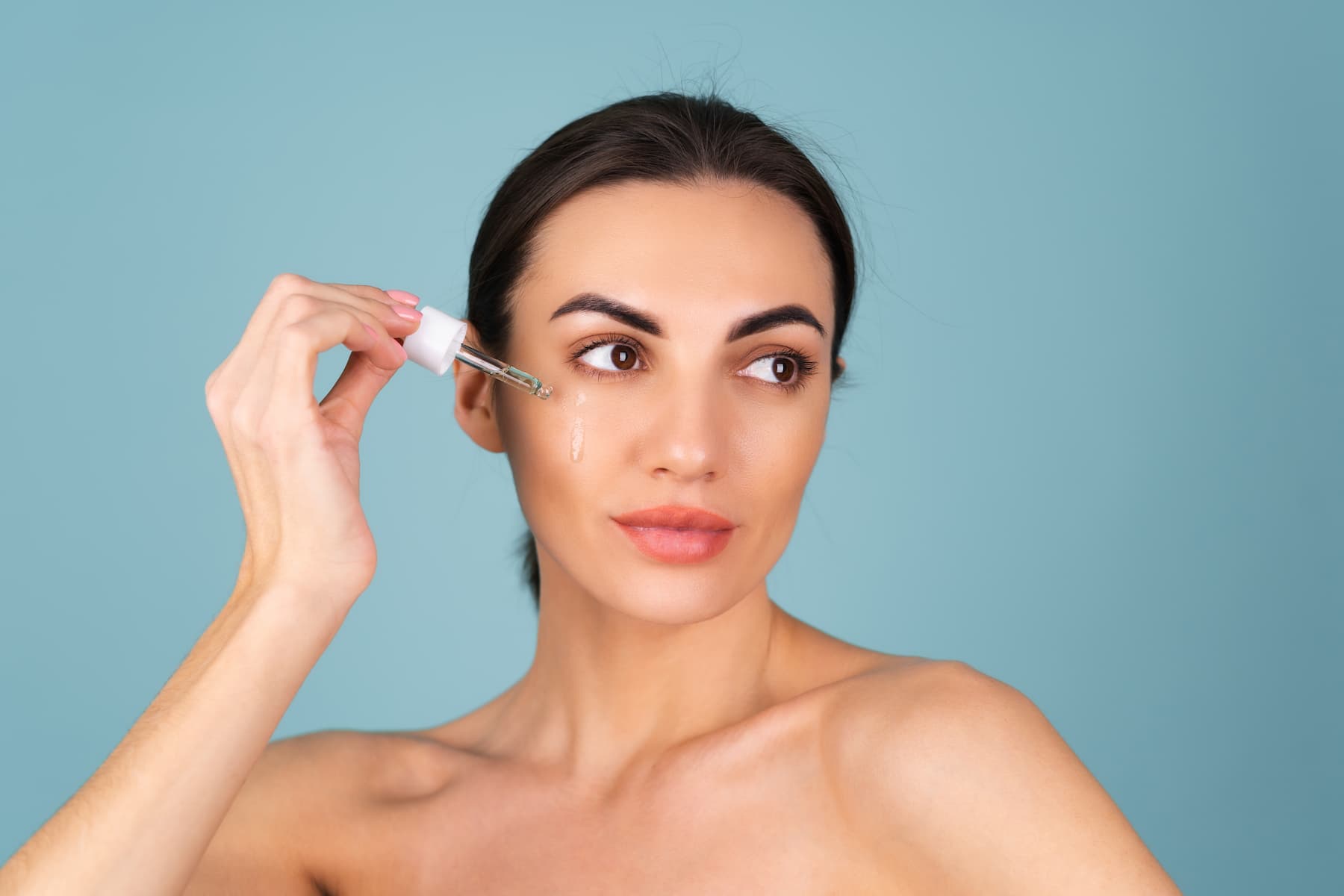
Solgar collagen with hyaluronic acid is a dietary supplement that supports skin and joint health.
